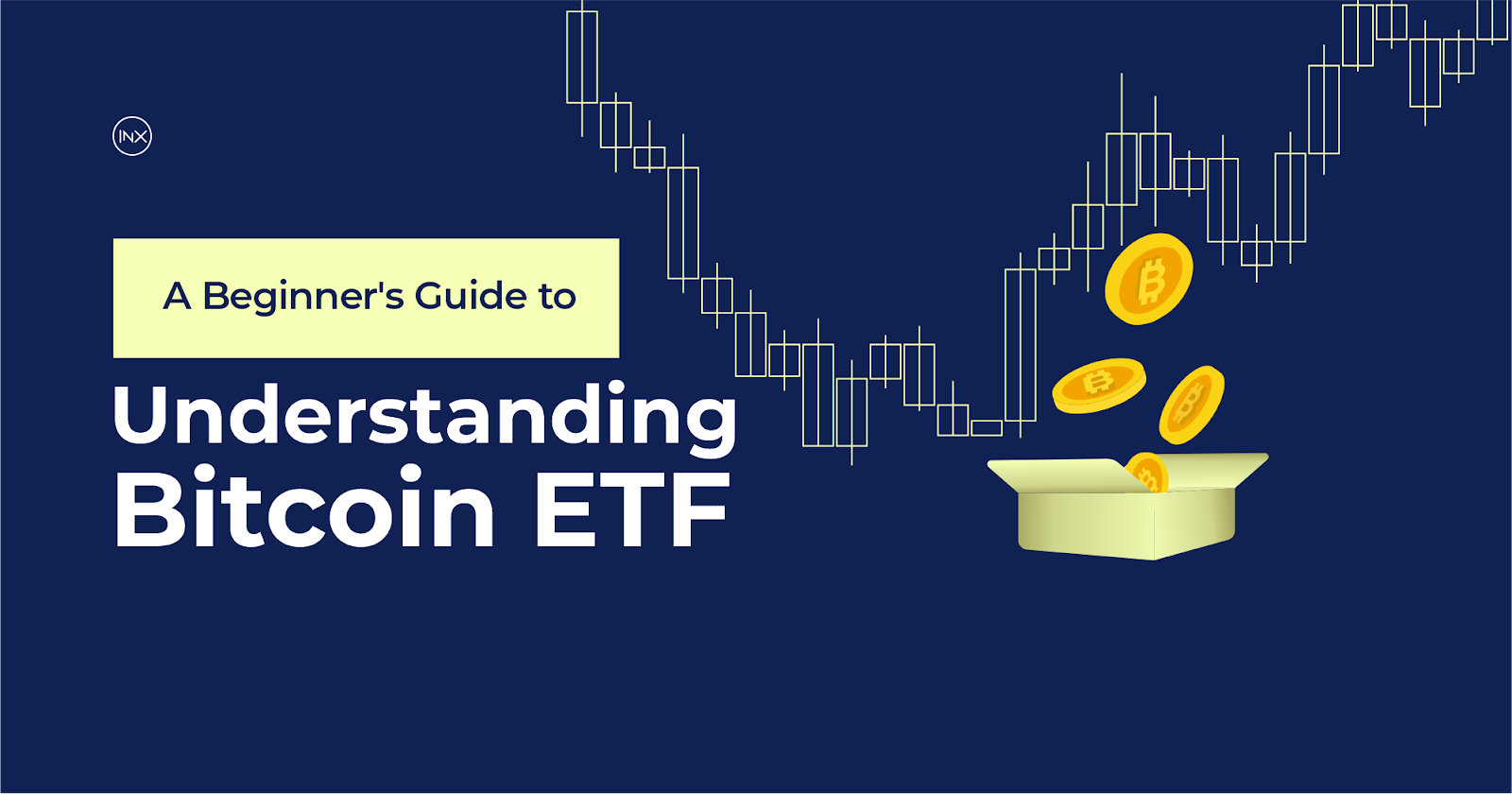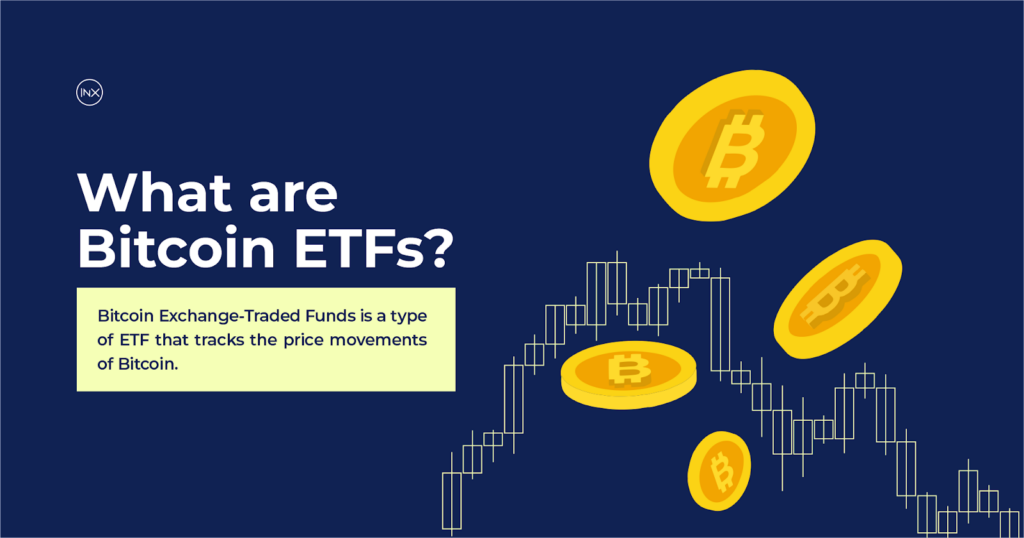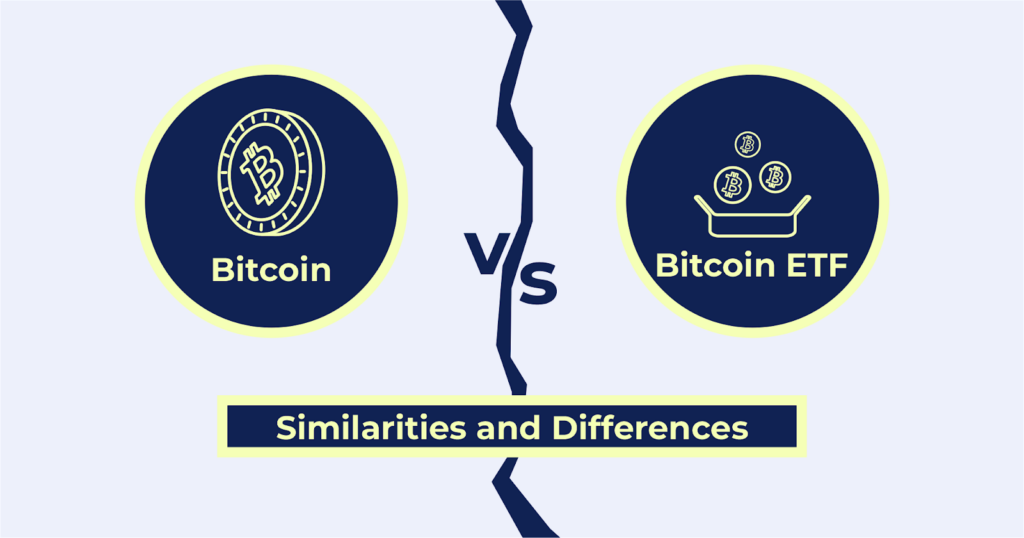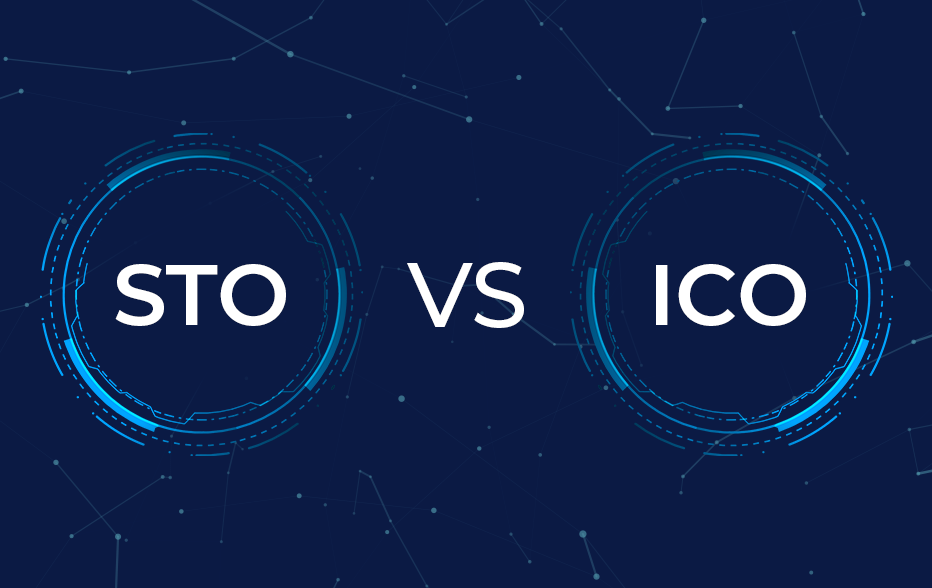A Beginner’s Guide to Understanding Bitcoin ETF

Bitcoin ETFs are institutional asset class options for investors who want to benefit from the price movement of Bitcoin without owning the digital asset itself. In this article, we will explain what bitcoin ETFs are, how they differ from bitcoin, and how you can benefit from them. But first, let’s define Bitcoin and ETF.
What is Bitcoin?
Bitcoin, often denoted as BTC, is the first decentralized cryptocurrency that sparked the entire blockchain revolution. Launched in 2009 by Satoshi Nakamoto, Bitcoin operates on a peer-to-peer network underpinned by the proof-of-work consensus mechanism.
With its 21 million cap on supply, Bitcoin’s scarcity mirrors precious assets like gold. Its decentralized nature ensures censorship resistance, making it immune to governmental controls or centralized intermediaries.
What are ETFs?
Exchange-traded funds (ETFs) are investment funds traded on stock exchanges, similar to individual stocks. An ETF holds multiple assets, such as stocks, commodities, or bonds, and its primary aim is to mirror the performance of these assets.
For investors, ETFs offer a way to gain exposure to a collection of assets without buying each individually. They are designed to provide investors with exposure to a diversified portfolio of assets, such as stocks, bonds, commodities, or other securities. ETFs often track a specific index, such as the S&P 500, and aim to replicate its performance.
What are Bitcoin ETFs?

Bitcoin ETFs, short for Bitcoin Exchange-Traded Funds, track the price movements of Bitcoin. It’s a fund that tracks the price of Bitcoin and allows you to invest in its price movements without actually owning any Bitcoin.
Buying a Bitcoin ETF is like buying Bitcoin, except you do not own the actual cryptocurrency. What you own is a share in the Bitcoin ETF that directly correlates with the actual price of Bitcoin on the cryptocurrency exchange market.
Therefore, when the price of bitcoin drops, the price of the bitcoin ETF will also drop to match the new price of bitcoin.
How Do the Bitcoin ETFs Work?
Bitcoin ETFs hold Bitcoin as the primary asset, offering investors exposure to the price movements of Bitcoin without directly owning the cryptocurrency. Investors can buy and sell shares or units of the ETF on traditional stock exchanges, much like they would trade stocks.
Bitcoin ETFs are issued by licensed financial institutions that purchase actual Bitcoin assets to back the funds. But a Bitcoin ETF doesn’t randomly assign a value to its shares. Instead, the provider must hold a reserve of actual Bitcoins.
When you invest in a Bitcoin ETF, the fund purchases the corresponding amount of Bitcoin, ensuring that the ETF’s price closely follows the actual market price of Bitcoin. The purchased bitcoins are kept securely, with custodians responsible for securing the assets. The issuer of the Bitcoin ETF ensures that they are on par with the Bitcoin stored with the custodian on a 1:1 basis. This is similar to how stablecoin’s pegging works.
Note that the entire process, from issuing the ETFs to listing them on the stock exchange, is subject to regulatory oversight by financial authorities.
Real-World Examples of Bitcoin ETFs
Bitcoin ETF adoption varies from one jurisdiction to the other because of the different regulatory laws.
Europe
Europe has seen an increased adoption in Bitcoin ETFs and ETPs (Exchange-Traded-Product) because of favorable regulations in countries like Germany and Switzerland. Below are the top BTC ETFs available in Europe:
- ETC Group’s BTCE: Listed on Deutsche Börse’s Xetra, BTCE was one of the first Bitcoin ETPs in Europe. It’s physically backed, meaning for each unit of BTCE, there’s an equivalent amount of Bitcoin held in custody.
- WisdomTree Bitcoin: A Bitcoin ETP listed on Switzerland’s SIX exchange that offers investors a way to gain exposure to Bitcoin without holding the cryptocurrency directly.
- 21Shares (formerly Amun): This firm offers a range of cryptocurrency ETPs, including those focused on Bitcoin, listed on the SIX Swiss Exchange.
- Flow Traders’ Cryptocurrency ETPs: A leading Dutch electronic liquidity provider, Flow Traders has co-listed several cryptocurrency ETPs on European exchanges.
- VanEck Vectors Bitcoin ETN: This is an exchange-traded note, a kind of unsecured debt security, that tracks Bitcoin’s price and is listed on Deutsche Börse’s Xetra.
- FiCAS Active Crypto ETP: Managed by Swiss firm FiCAS, this is the world’s first actively managed crypto ETP, providing exposure to Bitcoin and other major cryptocurrencies. It’s listed on the SIX Swiss Exchange.
Asia
The HKEC (Hong Kong Exchanges and Clearing Limited) introduced Asia’s first Bitcoin asset ETF (CSOP Bitcoin) that tracks standardized, cash-settled Bitcoin futures contracts.
United States
United States has also seen increased adoption of BTC ETFs with the SEC’s approval of its first Bitcoin ETF, ProShares Bitcoin Strategy ETF, in October 2021. Several other Bitcoin futures ETFs received approval and began trading; below are examples of Bitcoin ETFs in the United States:
- ProShares Bitcoin Strategy ETF (BITO): Launched in October 2021, this was the first Bitcoin futures ETF to be approved by the U.S. Securities and Exchange Commission (SEC). It tracks the performance of Bitcoin futures contracts rather than holding Bitcoin directly.
- Valkyrie Bitcoin Strategy ETF (BTF): Another futures-based ETF, it aims to provide exposure to Bitcoin through investment in Bitcoin futures contracts.
- VanEck Bitcoin Strategy ETF (XBTF): This ETF also provides exposure to Bitcoin through Bitcoin futures contracts traded on the CME.
- Invesco Bitcoin Strategy ETF: Similar to the others, this ETF offers exposure to Bitcoin through futures contracts.
- First Trust SkyBridge Bitcoin ETF Trust: A more recent entrant, this ETF also focuses on Bitcoin futures to give investors exposure to the cryptocurrency’s price movements.
While the SEC has approved several futures-based Bitcoin ETF, it is yet to approve a spot-based Bitcoin ETF that can directly track the prices of Bitcoin. But, the Blackwork Bitcoin ETF looks on track to be the first Spot-based Bitcoin ETF in the United States.
What is BlackRock Bitcoin ETF?
The BlackRock Bitcoin ETF, iShares Bitcoin Trust, is a spot Bitcoin ETF that directly tracks current prices of Bitcoin instead of futures contracts. BlackRock’s iShares Spot Bitcoin ETF is now listed on DTCC (Depository Trust & Clearing Corporation), which clears NASDAQ trades, with ticker $iBTC, This indicates a potential SEC approval, but the SEC still has until January 10, 2024, to finalize its decision on the ETF’s approval or denial.
BlackRock is the largest is the world’s largest asset management company; it filled for a Bitcoin Spot ETF in June. If BlackRock’s application gets the green light, it could pave the way for several other spot crypto ETF filings currently under SEC’s review.
Grayscale Bitcoin Trust (GBTC)
The Grayscale Bitcoin Trust (GBTC) is technically not an ETF, although it lets investors access Bitcoin through a traditional investment vehicle. GBTC is designed as a commodity investment product like SPDR Gold and is traded on OTCQX. Currently, the Grayscale is applying for SEC approval to convert GBTC into an ETF.
Bitcoin and Bitcoin ETFs Comparison: Similarities and Differences
Although Bitcoin ETs track the price performance of Bitcoin, it is important to note that Bitcoin and Bitcoin ETFs differ significantly. Let’s explore some of the similarities between Bitcoin and Bitcoin ETFs first.

Similarities between Bitcoin and Bitcoin ETFs
- Exposure to Bitcoin Price: When you invest in either Bitcoin or Bitcoin ETFs, your profit (or loss) is influenced by how the price of Bitcoin changes.
- Digital Nature: Bitcoin and Bitcoin ETFs are digital, so you can’t hold them physically.
- Cryptocurrency investment: Investing in Bitcoin through a Bitcoin ETF is like buying Bitcoin directly in a way. The potential benefits and risks associated with investing in cryptocurrencies still apply; the only difference is that you do not own the actual Bitcoin.
Differences between Bitcoin and Bitcoin ETFs
So, what differentiates Bitcoin from Bitcoin ETFs even though Bitcoin ETF tracks BItcoin performance? Here are some differences that keep Bitcoin ETF separate from Bitcoin cryptocurrency.
- Nature of Ownership: When you buy Bitcoin, you have direct ownership of the digital asset. You control the private keys necessary to access and manage your Bitcoin holdings. When you invest in a Bitcoin ETF, you do not directly own Bitcoin. Instead, you hold shares in a fund that owns Bitcoin. The fund’s custodian manages the bitcoin.
- Trading: You can buy and sell Bitcoin anytime on a cryptocurrency exchange or directly from another Bitcoin owner. Bitcoin ETFs, on the other hand, can only be bought and sold on traditional stock exchanges during their trading hours.
- Regulation: Bitcoin operates in a decentralized manner and falls under varying legal frameworks depending on the jurisdiction. On the other hand, Bitcoin ETFs are subject to regulatory oversight in the jurisdictions they are offered.
Advantages of Bitcoin ETFs
Bitcoin ETFs represent a fusion of the traditional financial world and cryptocurrencies, offering traditional investors a more comfortable way to invest in cryptocurrency. Here are some benefits of investing in ETFs:
- Simplicity: Bitcoin ETFs can be purchased just like stocks through traditional brokerage accounts, making it accessible even to those unfamiliar with cryptocurrency exchanges.
- Security: Investors don’t have to worry about private keys, wallets, or potential hacks. The ETF structure ensures the underlying Bitcoin is securely stored and insured by the fund manager.
- Regulated Environment: Bitcoin ETFs operate within a regulated framework, providing investors with an added layer of trust and transparency.
- Diversification: For traditional portfolios, Bitcoin ETFs offer a convenient way to diversify holdings by adding a touch of cryptocurrency exposure without the direct risks associated with holding Bitcoin.
Should I Invest in a Bitcoin ETF?
Investing in a Bitcoin ETF is not a decision to be taken lightly. There are several key considerations to weigh, starting with the associated fees. Unlike buying Bitcoin outright, an ETF comes with management fees, as you’re paying for the convenience and expertise of fund managers. These costs, while typically modest, can add up over time and eat into your potential returns.
Another critical factor is the risk of rehypothecation. When you buy a Bitcoin ETF, you’re essentially investing in a fund that owns Bitcoin on your behalf. The fund may lend these assets out to other parties, a practice known as rehypothecation. This means that the same Bitcoin could potentially be claimed by multiple parties, adding an extra layer of risk to your investment.
Lastly, investing in a Bitcoin ETF means relinquishing self-custody. Unlike holding Bitcoin directly, where you have complete control over your assets, with an ETF, the fund manager holds the Bitcoin. While these funds are typically highly secure, the lack of self-custody does mean that investors have less direct control over their assets.
Investors in the US don’t need to wait for a Bitcoin ETF to gain exposure to Bitcoin. Sign up for INX to take advantage of our US-regulated platform for trading digital assets.
As Bitcoin continues to reshape the financial landscape, Bitcoin ETFs offer investors a more familiar and regulated path to gain exposure to this digital asset. From the first global listing of a Bitcoin ETF in Canada to the launch of innovative products like the ProShares Bitcoin Strategy ETF in the U.S., these funds are carving out new opportunities in the investment world. Understanding their workings and implications is essential for any confident investor looking to navigate the ever-evolving cryptocurrency market.
Final Thoughts
Bitcoin ETF offers a good way for beginners and traditional investors to profit from the price movement of Bitcoin. However, your research shouldn’t stop here; consider learning about other ways of investing in cryptocurrency, like security token offerings.
INX.one provides a gateway to explore security token trading, cryptocurrency trading, and primary market offerings in a regulated and secure platform. Our educational resources are also a great way to stay abreast of market developments and regulatory changes.
Frequently Asked Questions (FAQs)
What is the difference between Bitcoin and Bitcoin ETF?
Bitcoin is a cryptocurrency traded on various exchanges, while Bitcoin ETFs are investment funds that hold Bitcoin as their primary asset and are traded on stock exchanges.
How are Bitcoin ETFs different from traditional ETFs?
Bitcoin ETFs track the price of Bitcoin, while traditional ETFs track indexes of stocks, bonds, or commodities.
Are Bitcoin ETFs safe for beginners?
Bitcoin ETFs are safer for beginners than directly owning Bitcoin, as they offer regulatory oversight and investor protection. However, they still carry risks and require caution, research, and due diligence.
How do I choose the right Bitcoin ETF?
To choose the right Bitcoin ETF, research reputable providers with a track record of compliance and reliability. Consider fees and regulatory compliance and how well the ETF tracks the performance of Bitcoin before making a choice.
What are the tax implications of investing in Bitcoin ETFs?
Tax implications on Bitcoin ETFs vary by country. Therefore, consult with a tax professional in your jurisdiction to understand how you can navigate the tax scene.
Can I redeem my Bitcoin ETFs for actual Bitcoins?
Typically, no. You’re investing in the price movement, not the actual Bitcoins.
What is the ProShares Bitcoin Strategy ETF?
In the U.S., the ProShares Bitcoin Strategy ETF emerged as a groundbreaker. This ETF doesn’t track Bitcoin’s price directly; instead, it follows Bitcoin futures contracts. Launched in October 2021, it quickly made headlines as the first SEC-approved Bitcoin-related ETF. This product provides a way for investors to gain exposure to Bitcoin’s price movements without the need to handle the cryptocurrency directly, marking a pivotal step towards the integration of digital assets into traditional finance.
The INX Digital Company INC October 25, 2023
The INX Digital Company inc. is an expert in the field of finance, crypto and digital securities.





